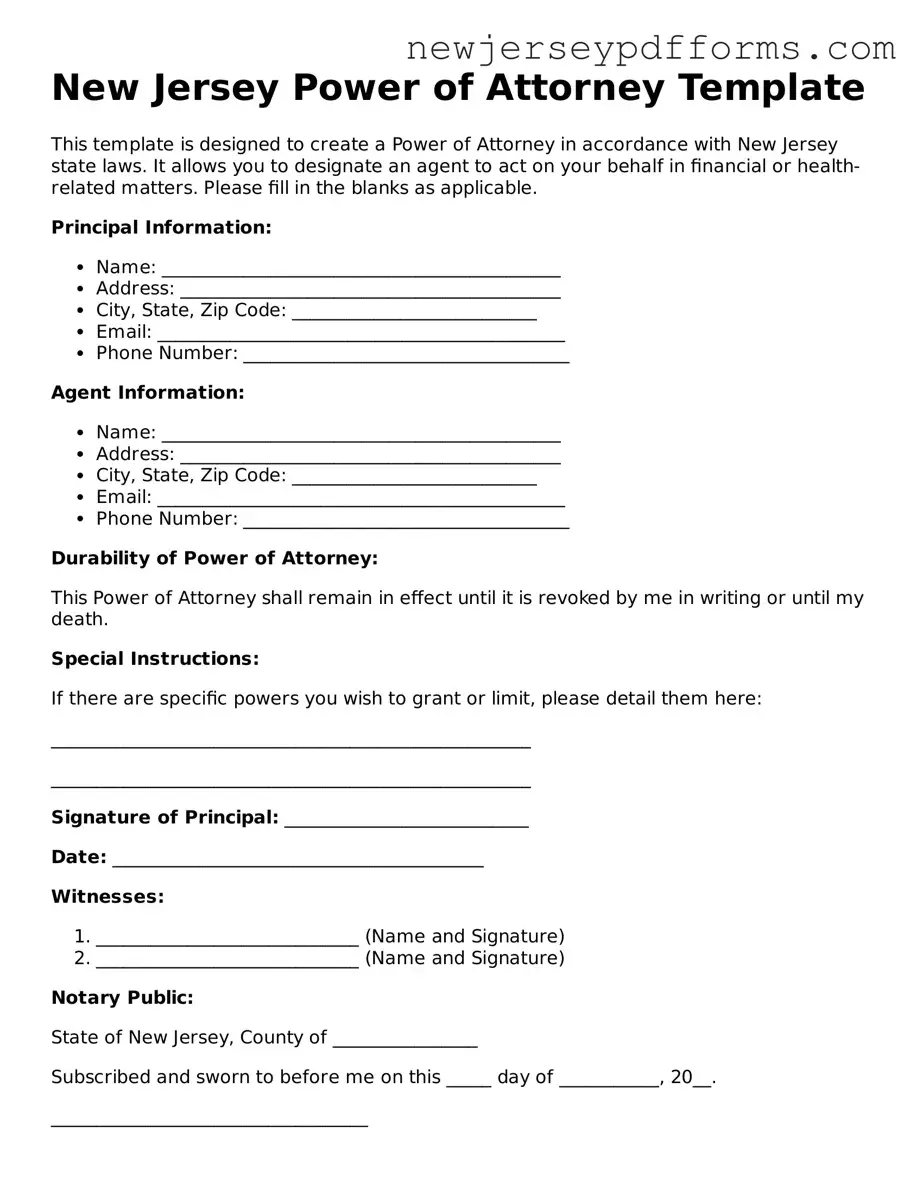The New Jersey Power of Attorney form is similar to the Durable Power of Attorney. Both documents allow an individual, known as the principal, to appoint someone else, called an agent, to make decisions on their behalf. The key difference lies in durability; a Durable Power of Attorney remains effective even if the principal becomes incapacitated. This ensures that the agent can continue to manage the principal's affairs during times of illness or disability.
Another document akin to the New Jersey Power of Attorney is the Medical Power of Attorney. This specific form focuses on healthcare decisions. It grants an agent the authority to make medical choices for the principal if they are unable to communicate their wishes. While the general Power of Attorney can cover a wide range of financial and legal matters, the Medical Power of Attorney is strictly for health-related issues.
The Springing Power of Attorney shares similarities with the New Jersey Power of Attorney in that it allows an agent to act on behalf of the principal. However, the Springing Power of Attorney only becomes effective under certain conditions, typically when the principal is incapacitated. This can provide peace of mind, as the agent's authority is limited until the principal truly needs assistance.
The Healthcare Proxy is another document that resembles the Medical Power of Attorney. It designates an individual to make medical decisions for the principal when they cannot do so themselves. Both documents aim to ensure that a person's healthcare preferences are respected, but a Healthcare Proxy is often more focused on end-of-life decisions and treatment options.
The Living Will also parallels the New Jersey Power of Attorney, particularly the Medical Power of Attorney. A Living Will outlines a person's wishes regarding medical treatment in situations where they are unable to express their preferences. It is not a decision-making tool like a Power of Attorney but serves to guide the agent in making choices that align with the principal's values and desires.
The Financial Power of Attorney is closely related to the New Jersey Power of Attorney. Both forms empower an agent to handle financial matters on behalf of the principal. The Financial Power of Attorney may be more focused on specific financial transactions, such as managing bank accounts, paying bills, or filing taxes, while the general Power of Attorney can encompass broader responsibilities.
The Trust document, particularly a revocable living trust, shares some characteristics with the Power of Attorney. Both allow for the management of a person's assets. However, a trust can provide more comprehensive estate planning benefits, including avoiding probate and providing for asset distribution after death. A Power of Attorney, on the other hand, is more about managing affairs during the principal's lifetime.
In navigating various financial and legal documents, understanding the nuances of forms such as the Sample Tax Return Transcript can be invaluable. This IRS document encapsulates critical details about an individual's tax situation, which may be essential for various applications, including loan requests and income validation. For those seeking guidance on how to manage tax documentation effectively, resources like PDF Document Service can provide useful templates and insights to streamline the process.
The Guardianship document is another legal tool that resembles the Power of Attorney. It is used when a court appoints someone to make decisions for an individual who is unable to do so. While a Power of Attorney is created voluntarily by the principal, guardianship is often established through legal proceedings, making it a more formal arrangement.
Lastly, the Advance Directive is similar to the New Jersey Power of Attorney in that it encompasses both healthcare and financial decisions. An Advance Directive typically includes both a Living Will and a Medical Power of Attorney, ensuring that an individual's wishes regarding medical treatment and end-of-life care are clearly stated. This document can streamline decision-making for agents and healthcare providers.

